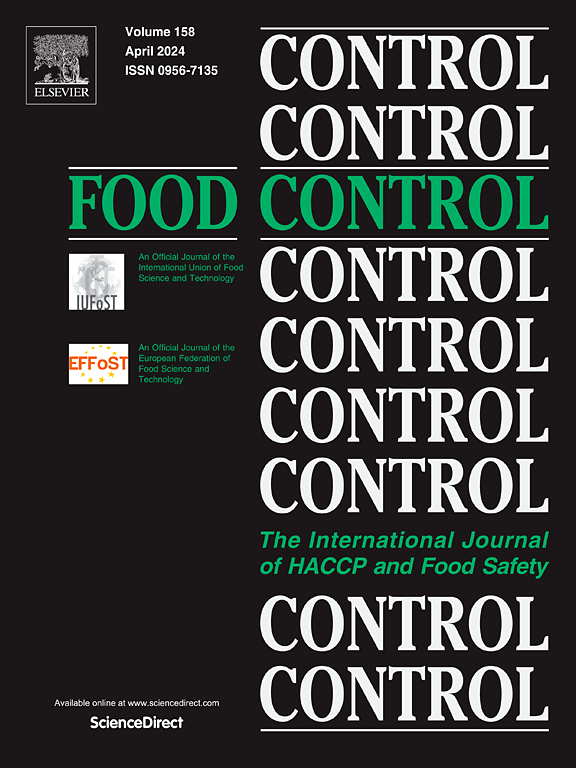新型多肽佐剂增强了美利曲辛对耐甲氧西林金黄色葡萄球菌的抗菌特性及其作为潜在食品防腐剂的功效
IF 5.6
1区 农林科学
Q1 FOOD SCIENCE & TECHNOLOGY
引用次数: 0
摘要
美乐汀是一种著名的抗菌肽(AMP),由于其强大的抗菌特性,特别是在面对耐多药(MDR)细菌时,在食品防腐方面显示出巨大的潜力。然而,由于美乐汀对细胞的选择性较差,将其开发为食品防腐剂受到了限制,因此需要创新策略来解决美乐汀的应用瓶颈。在此,我们研究了两种线性肽佐剂(3-WP 和 9-RP),它们与美乐汀对常见革兰氏阳性菌具有明显的协同作用。它们的协同作用增强了美利汀对耐甲氧西林金黄色葡萄球菌(MRSA)的抗菌效力,同时降低了美利汀抗菌活性所需的剂量,这有助于提高美利汀的细胞选择性。从机理上讲,3-WP 会破坏细胞壁膜的通透性,诱导活性氧(ROS)的产生,并抑制能量代谢。3-WP/ Melittin 组合在食品贮藏中表现出良好的抗菌效果。我们的研究结果凸显了 3-WP 作为美乐汀的多肽佐剂在抗击与 MDR 相关的食源性疾病和开发安全有效的多肽生物防腐剂方面的巨大潜力。本文章由计算机程序翻译,如有差异,请以英文原文为准。
The novel peptide adjuvants potentiate antimicrobial properties of melittin against methicillin-resistant Staphylococcus aureus and their efficacy as potential food preservatives
Melittin, a notable antimicrobial peptide (AMP), shows great potential in food preservation due to its robust antimicrobial properties, especially when facing multidrug-resistant (MDR) bacteria. However, developing melittin as a food preservative is limited by its poor cell selectively, necessitating innovative strategies are needed to address the application bottleneck of melittin. Here, we characterize two linear peptide adjuvants (3-WP and 9-RP), which exhibited obvious synergistic effects with melittin against common Gram-positive bacteria. Their synergistic effects potentiated antimicrobial efficacy of melittin against methicillin-resistant Staphylococcus aureus (MRSA), while reduced the required dose of melittin for antimicrobial activity, which is contributed to improving the cell selectively of melittin. Mechanistically, 3-WP disrupted cell wall membrane permeability, induced reactive oxygen species (ROS) production, and inhibited energy metabolism. The 3-WP/melittin combination exhibited favorable antimicrobial effects in food storage contexts. Our findings highlighted the great potential of 3-WP as a peptide adjuvant of melittin for combating MDR-associated foodborne diseases and developing safe and effective peptide-based bio-preservatives.
求助全文
通过发布文献求助,成功后即可免费获取论文全文。
去求助
来源期刊

Food Control
工程技术-食品科技
CiteScore
12.20
自引率
6.70%
发文量
758
审稿时长
33 days
期刊介绍:
Food Control is an international journal that provides essential information for those involved in food safety and process control.
Food Control covers the below areas that relate to food process control or to food safety of human foods:
• Microbial food safety and antimicrobial systems
• Mycotoxins
• Hazard analysis, HACCP and food safety objectives
• Risk assessment, including microbial and chemical hazards
• Quality assurance
• Good manufacturing practices
• Food process systems design and control
• Food Packaging technology and materials in contact with foods
• Rapid methods of analysis and detection, including sensor technology
• Codes of practice, legislation and international harmonization
• Consumer issues
• Education, training and research needs.
The scope of Food Control is comprehensive and includes original research papers, authoritative reviews, short communications, comment articles that report on new developments in food control, and position papers.
 求助内容:
求助内容: 应助结果提醒方式:
应助结果提醒方式:


